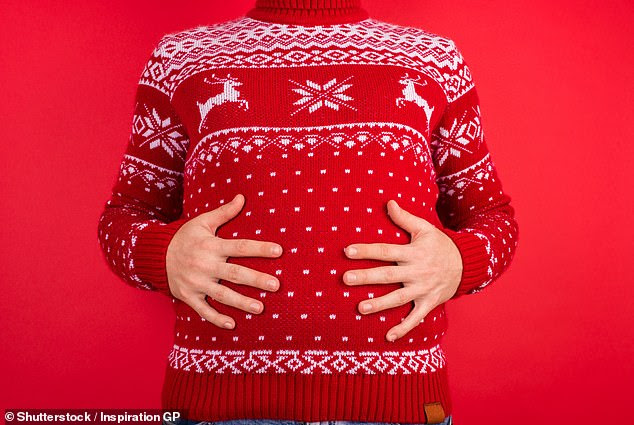By JO WATERS
Why is heartburn so much more of a problem at this time of year?
Partly it’s because fatty meals — roast meats, potatoes cooked in goose fat, brandy butter — delay gastric emptying. As a result, the stomach becomes more full, stomach acid builds up and is more likely to rise up the oesophagus, causing heartburn, a burning sensation behind the breastbone.
Boy with missing limb tries out new Iron Man-themed bionic armSisters needed amputations after both born with rare conditionChinese TV shows situation after outbreak of respiratory illness
‘If you’ve never experienced chest pain before, you may be worried it’s a heart attack,’ says Peter Whorwell, a professor of gastroenterology at Manchester University.
‘But heart attacks cause a crushing pain that may radiate to the arms, particularly the left arm or neck. If you are experiencing this type of pain, seek urgent medical help.’
Over-the-counter remedies such as Gaviscon contain chemicals including sodium alginate and potassium hydrogen carbonate that coat the oesophagus to prevent acid irritation; they also form a gel on the top of stomach fluid to stop more acid rising into the throat and neutralise acid.

Why is heartburn so much more of a problem at this time of year?
Why is heartburn so much more of a problem at this time of year?
While these remedies are ¿very effective, if you¿ve no heartburn remedies in the house, try drinking milk for some temporary relief from symptoms (stock image)

While these remedies are ‘very effective, if you’ve no heartburn remedies in the house, try drinking milk for some temporary relief from symptoms (stock image)
While these remedies are ‘very effective, if you’ve no heartburn remedies in the house, try drinking milk for some temporary relief from symptoms: it will act as a buffer against the acid’, adds Professor Whorwell.
Drinking fruit juices can make heartburn worse as it’s acidic, he says. ‘High-strength peppermint teas and preparations can also worsen heartburn even though they are sometimes recommended to settle the stomach and aid digestion.’ This is because they relax the valve between the top of the stomach and the oesophagus. Professor Whorwell says: ‘If your symptoms persist for more than two to three weeks, see your doctor to check there’s no underlying cause.’
Could a hangover supplement help?
The splitting headache, nausea and fatigue of a hangover are down to dehydration — alcohol suppresses a hormone called vasopressin that sends signals to the kidneys, and as a result they retain fluid.
This increases urine output and excess fluid loss, causing thirst, headache and fatigue.
Alcohol also irritates the stomach lining and increases acid release, causing nausea and stomach pain.
Dr Ann Nainan, a GP in London, says: ‘It can take up to 24 hours for the body to clear the toxic by-products of alcohol metabolism. To rehydrate, drink one glass of water before bed, another on waking and then eight to ten cups during the day.
‘Also, you can try rehydration salts, take paracetamol or ibuprofen (if safe for you), and eat a healthy breakfast such as porridge or eggs and toast to help maintain healthy blood sugar levels.’

The splitting headache, nausea and fatigue of a hangover are down to dehydration (stock image)
The splitting headache, nausea and fatigue of a hangover are down to dehydration (stock image)
One of the liver’s roles is to help release glucose from the cells for energy. But when you drink alcohol, it prioritises breaking this down instead. This can lead to low blood sugar, with symptoms such as headache, nausea, feeling shaky and confusion.
Avoid fatty foods such as a fry-up as they can put a strain on your digestive system because they delay gastric emptying.
You could try a supplement: a study involving 19 men, published in the journal Alcohol and Alcoholism in 2020, found that those who took a supplement of the amino acid L-cysteine (1,200mg dose) had less severe headaches and alcohol-related nausea.
It’s thought the compound helps neutralise acetaldehyde, the toxic by-product of alcohol.
The researchers concluded that the effects of L-cysteine were unique and ‘seem to have a future in preventing or alleviating these harmful symptoms’.
‘Despite the very small scale of the study, the intriguing findings could be a promising avenue to explore further for alleviating alcohol-related hangover symptoms,’ says Dr Nainan.
L‑cysteine can also be found in eggs, turkey and yoghurt.
Open windows for seasonal sniffles

If you have developed a runny nose, watery eyes and sneezing, it might not be a cold but an allergic reaction to your Christmas tree — or, rather, to mould on it.
In a small study published in the journal Annals of Allergy, Asthma and Immunology, a small sample of trees from the U.S. were found to carry 50 types of mould, two-thirds of which cause hay fever symptoms.
Around one in ten people has an allergy to mould, and pine trees are known to harbour mould spores, says Dr Helen Evans-Howells, a GP and allergy specialist, and trustee of Anaphylaxis UK – members of the ready2reactuk campaign.
‘Mould spores from the tree multiply indoors in the warm conditions and trigger allergy symptoms,’ she says.
‘Some people think they have a cold and it’s only when they put the tree outside after Christmas that they realise it was triggering their symptoms.
If you have developed a runny nose, watery eyes and sneezing, it might not be a cold but an allergic reaction to your Christmas tree ¿ or, rather, to mould on it (stock image)
If you have developed a runny nose, watery eyes and sneezing, it might not be a cold but an allergic reaction to your Christmas tree — or, rather, to mould on it (stock image)
‘For most people the symptoms are fairly mild, although the mould spores may be a trigger for an asthma attack in those who have the condition.
‘An artificial tree can harbour dust mites if it’s been stored in the loft, or shed, and cause similar symptoms, particularly if you decorate it with dusty ornaments.’ Dr Evans-Howells recommends treating symptoms by opening windows to ventilate the room, getting someone else to clean up dust, taking antihistamines and using nasal steroid spray before putting your tree up and while it’s in the house.
Walk off that post-lunch bloat
Walking after meals improves digestion because it stimulates the gut and increases blood flow to all muscles, including those in the digestive system, so food is moved through the body more quickly.
Peppermint oil capsules can help with bloating by relaxing the bowel wall, and sipping chamomile tea may help break up gas in the digestive tract, but evidence for the latter is lacking.
Massaging your tummy from right to left may also help release trapped wind, as it follows the path of the large intestine.
Walking after meals improves digestion because it stimulates the gut and increases blood flow to all muscles, including those in the digestive system, so food is moved through the body more quickly (stock image)

Walking after meals improves digestion because it stimulates the gut and increases blood flow to all muscles, including those in the digestive system, so food is moved through the body more quickly (stock image)
Beat the festive blues
It’s common to feel overwhelmed at Christmas/New Year, says clinical psychologist Dr Roderick Orner, a visiting professor of primary and pre-hospital care at Lincoln University.
In a survey of 2,000 people by Skipton Building Society in 2021, three in ten claimed their mental health takes a ‘nosedive’ over Christmas. Dr Orner says: ‘What we all need is a period away from stress, which is exactly what we don’t get at the moment — rest is important to recover from the physical exhaustion as well as psychological stress.
‘Spend time with people who support you: you can put up with a lot of unpleasantness if you know you’ll also see or hear from others who appreciate you. Try to carve out time for yourself to do something you enjoy and spend time outdoors to counter stress.’
Dr Gayle Watts, a clinical psychologist at Turning Tides Psychology, says we all have three emotional regulation systems: threat, drive and soothe.
‘At Christmas, our drive system is often activated as we rush around doing things and seeing people and our threat system is often activated by all of the stress and anxiety that Christmas can bring. Our soothe system often gets overlooked, so make sure you are spending time trying to activate this system by doing things that are calming and relaxing. Take time to slow things down and to “just be”.’
And if you get the winter vomiting bug…
Infections of norovirus are common over the festive season and can spread rapidly through households.
This is because the virus is airborne as well as being transmitted via the faecal-oral route through lack of hand-washing after going to the bathroom, says gastroentreologist Professor Peter Whorwell.
‘Symptoms include projectile vomiting and diarrhoea, plus loss of appetite. You will usually get better within 48 hours, three days at most, but the biggest danger is dehydration — particularly in the elderly and children. If your urine becomes dark, seek medical advice.’
He recommends sipping rehydration salt solutions. ‘If you don’t have any, you could try flat lemonade [not diet lemonade], as the sugar in it stops you secreting so much fluid in your bowel. I advise patients who have infectious diarrhoea to avoid taking the diarrhoea treatment loperamide, for while it stops diarrhoea, it may take longer for the virus to be flushed out of your system.’
Clear up vomit immediately, bin it outside and clean hard surfaces with diluted bleach. Throw away uncovered food in a room where someone has vomited, clean toothbrushes in bathrooms with boiling water and store in plastic bags.
Professor Whorwell adds: ‘My tip for avoiding food poisoning bugs is remembering to wash your hands after handling raw meat — I do this after putting the turkey in the oven. Other than that, just concentrate on enjoying Christmas.’

Leave a Reply